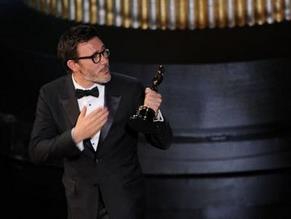|
World Jewish News

Michel Hazanavicius won the best director Oscar on Sunday in Hollywood.
|
'Artist' director: from small screen to Oscar win
27.02.2012, Culture Frenchman Michel Hazanavicius, who won the best director Oscar on Sunday, has come a long way from making TV shows and adverts to scoop Hollywood's highest honor for "The Artist."
The 44-year-old, who triumphed over veterans including Martin Scorsese and Woody Allen, had already won a series of gongs for his black-and-white homage to the silent movie era.
"I am the happiest director in the world right now," he said in his acceptance speech.
He is only the second French filmmaker honored by his Hollywood peers, following in the footsteps of Franco-Polish director Roman Polanski who won a best director Oscar in 2003 for "The Pianist."
Hazanavicius was only 20 when he joined French cable TV broadcaster Canal+ at the end of the 1980s, making his name there along with a comedy group called, perhaps inauspiciously, "Les Nuls" (The Useless Ones).
While Canal+ enjoyed its glory years, the young Hazanavicius -- who has a Lithuanian Jewish family background -- used his screenwriting talent through the mid-1990s to write and direct satirical shows.
It was also for Canal+ that he made a TV film in 1993, "La classe americaine" ("American Class"), the first sign of his love for Hollywood, made entirely by stitching together pieces of films by studio giant Warner Bros.
In parallel he was making TV adverts, did some acting for his friends from the Nuls and wrote several feature film screenplays.
His real writer-director debut was in 1998 with the comedy "Mes Amis" ("My Friends"), in which he cast his own buddies Yvan Attal, Karin Viard, Mathieu Demy and his brother Serge Hazanavicius.
But the film went virtually unnoticed, and it was another eight years before he got behind the camera again for 1950s-style spy movie "OSS 117," which marked the start of his collaboration with "Artist" star Jean Dujardin.
The film, and a 2009 sequel, at last brought him box office success, at least at home, with 2.3 and 2.5 million tickets sold in France.
"The Artist" was made with the same team as the "OSS" films, but this time Hazanavicius went back even further in time, to Hollywood's silent era.
The director at one stage planned to set the movie in the German expressionist film epoch, before opting for silent-era Hollywood "because there they took most care of the story."
"Feelings expressed in the masterpieces of that era are human, based on real emotions, and that is what I was looking for," he said in Los Angeles, where he became a frequent visitor as "The Artist" stacked up prizes in recent months.
Following his Oscars triumph, Hazanavicius is unlikely to have problems funding future films. After he won three Golden Globes last month he said he had a "huge opportunity for a director, to become an international director."
"You become less dependent on traditional means of funding, like television, so you have more freedom. And that's what we're all looking for," he told AFP.
His next film retains a link with Hollywood: he is adapting Fred Zinnemann's 1948 "The Search," in which a US soldier played by Montgomery Clift helps a young Auschwitz survivor to find his mother.
The film will be transposed into the present day in the Czech Republic, and the main character will be played by Hazanavicius' wife Berenice Bejo, with whom he has two children, and who starred in "OSS 117" and "The Artist."
EJP
|
|
